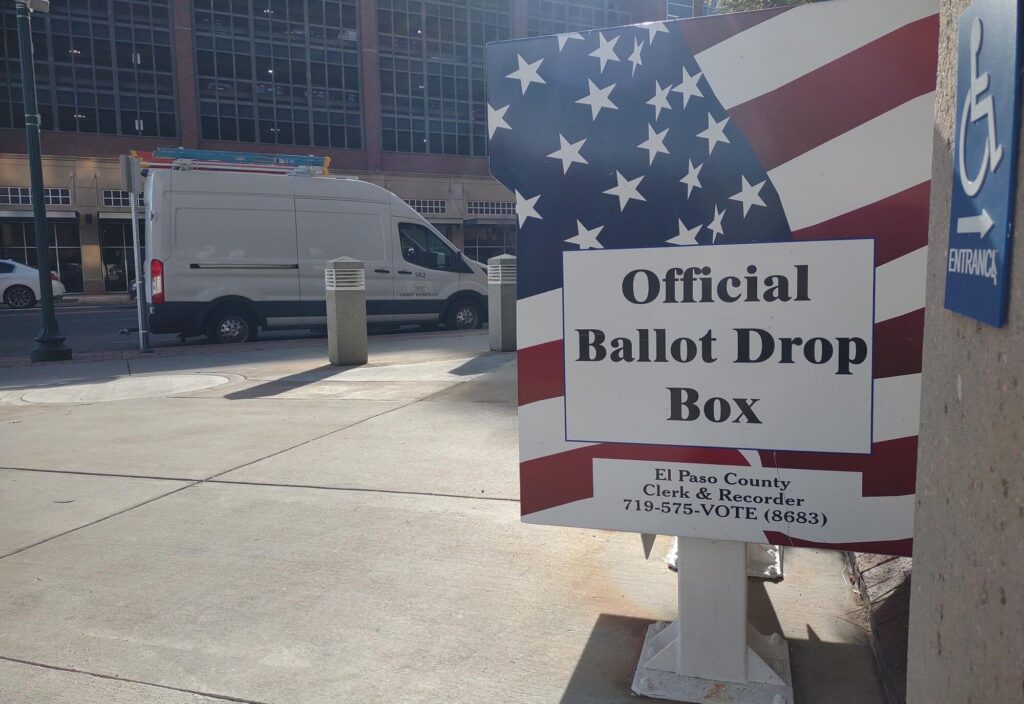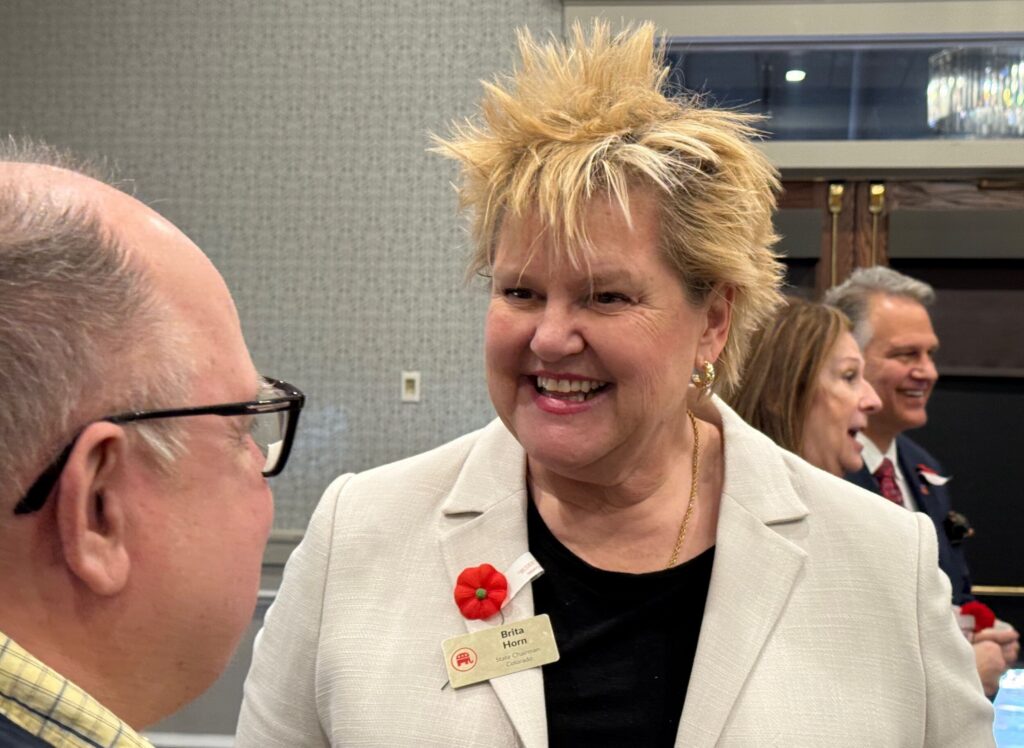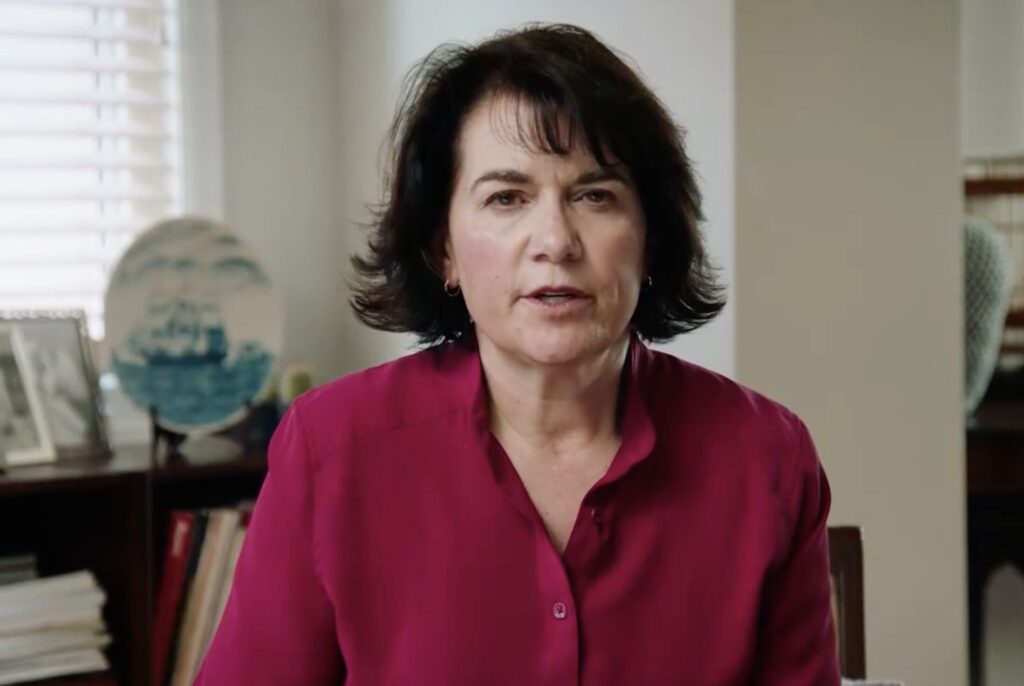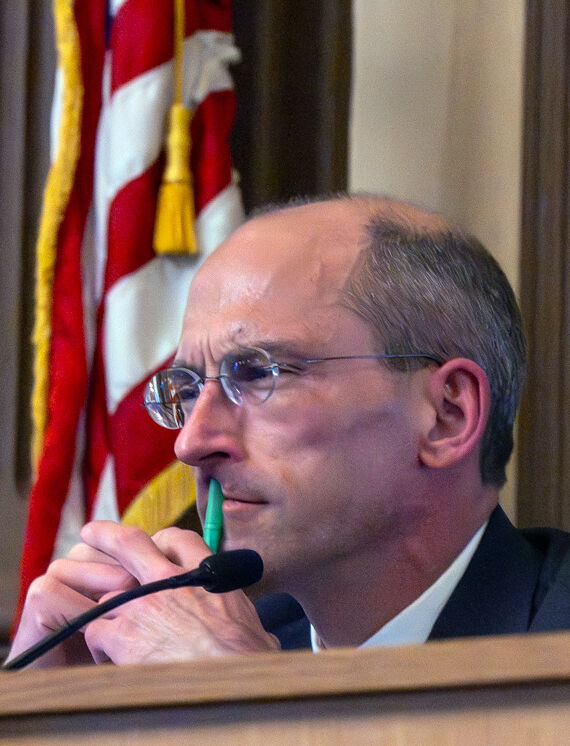Civil unions bill dealt bad hand

Backers of legalized civil unions for same-sex couples in Colorado will have another bite at the apple after Gov. John Hickenlooper this week ordered lawmakers to hold a special session to consider proposals that died when House Republican leaders and the bill’s supporters engaged in a standoff over whether to bring the measure to a vote.
“We need to have an open discussion of the issue and at least work toward a final resolution,” Hickenlooper said on Wednesday, a day after a Republican-led filibuster doomed the civil unions bill along with dozens of other pieces of legislation caught in the procedural cross-fire.

Citing what he termed “an overwhelming need” for all sides to debate the bill, Hickenlooper said his office had received a record number of phone calls and emails urging him to bring lawmakers back into session”I spent a long time in the restaurant business, and a lot of people who tried to help us create that business didn’t have the same rights as everyone,” he said. Noting that he was suffering from sleep deprivation, the governor, in a choked up voice, continued. “I had a call yesterday from one of them just to ask, ‘If not now, when?'”
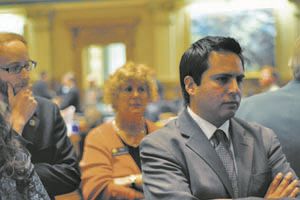
The special session kicks off on Monday, just five days after the Legislature finished its 120-day regular session, and will deal with seven measures specified by the governor, including the Civil Unions Act.
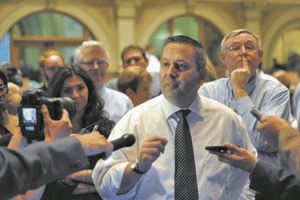
Every bill starts fresh in a special session, and legislative leadership has broad powers to reassign committee rosters and set the calendar, so there’s no guarantee the Republican-controlled House will even let the bill advance as far as it did the first time, an outcome Hickenlooper acknowledged was a distinct possibility.

“It’s not over till the speaker’s special session is over,” said the bill’s House sponsor, Minority Leader Mark Ferrandino, D-Denver, after Hickenlooper’s announcement. “The governor is giving us one last chance to get civil unions this year. The House Democrats, with our Republican supporters, will be working as hard as we can to seal the deal.”
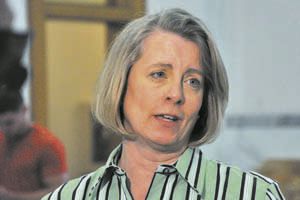
While he allowed that the governor “has every right to call a special session,” House Speaker Frank McNulty, R-Highlands Ranch, accused the governor and his fellow Democrats of playing politics with the special session, which will cost an estimated $23,500 a day.
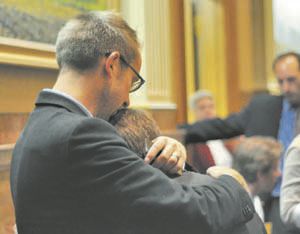
“Reviewing Gov. Hickenlooper’s release, it’s clear that he cluttered his call for a special session with bills that could have passed yesterday with bipartisan support,” McNulty said in a statement, adding, “if the goal of this session is to pass bills that had broad, bipartisan support, we could have done that yesterday. It’s not lost on us that Gov. Hickenlooper stood silent last year as Senate Democrats killed numerous important bills as time ran out on the 2011 session.”

For his part, Hickenlooper declined to blame either party for the impasse that resulted in the demise of so many bills.
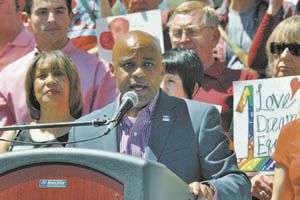
“Everything that happened last night was within the rules,” he said. “It certainly wasn’t the outcome that I’d hoped for and I think many people expected, but I’m not going to criticize the process.”

The night before, as the clock ticked foward in a tense House of Representatives, Hickenlooper tried but failed to broker a compromise between the bill’s sponsors and Republican leaders seeking to delay the bill past a deadline that would ensure it wouldn’t survive.

“Unfortunately, we didn’t get that Hickenlooper magic at the end, but he tried his darnedest to get this done,” said Ferrandino late Tuesday night, minutes after McNulty had declared the civil unions bill dead.
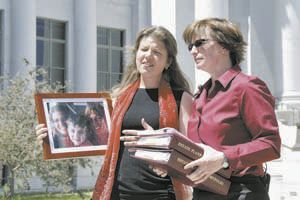
“We are at an impasse on civil unions and that’s not going to be resolved,” a distraught-looking McNulty told reporters, hours after GOP leaders had halted proceedings to prevent Democrats from forcing a vote on the measure.
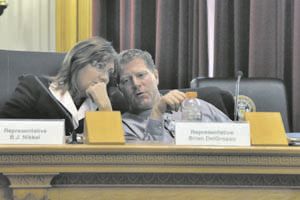
As McNulty finished his pronouncement, a chorus of boos rained down on the chamber from a nearly packed gallery, and moments later a chant of “Shame on you!” rose up before sergeants-at-arms cleared the spectators.

It was a dispiriting end to hours of procedural maneuvering that commenced earlier that evening after the measure had cleared the last of three GOP-controlled committees required before the full House could consider it.
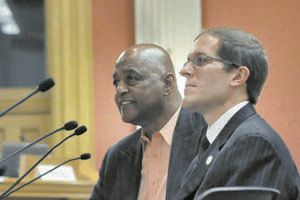
A virtually identical bill died last year at its first committee hearing in the Republican-controlled House, but sponsors were confident they could pass the legislation this year if they could get it to the House floor, predicting that at least six and as many as 10 Republicans would vote with the chamber’s 32 Democrats. The bill, sponsored in the Senate by Sen. Pat Steadman, D-Denver, cleared that chamber last month with the support of three Republicans, Sens. Jean White of Hayden, Ellen Roberts of Durango, and Nancy Spence of Centennial.

At nearly every point as the bill moved forward in the House, Democrats charged that Republicans were stalling the process and worried aloud that GOP leadership might succeed in killing the measure by delaying it at crucial points. But, after some initial foot-dragging as various deadlines loomed, Republican-controlled panels got down to business, debated the bill in three committees and held votes destined to pass it on to the next step with a single GOP lawmaker joining Democrats to wave it ahead.

By the same token, Republicans blasted the bill’s sponsors for sitting on the bill in the Senate and waiting until the waning days of the session to move it over to the House, charging that Democrats had intended all along to force a stalemate in hopes of reaping political gains.
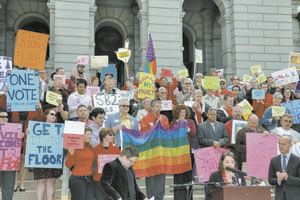
“Senate Democrats sent us this bill at the absolute 11th hour,” complained a visibly angry House Assistant Minority Leader Mark Waller, R-Colorado Springs, when floor action had come to a stop on Tuesday night. “They know this is the most controversial bill we’re going to hear in the state legislature this year. They sat on this bill for 108 days.”
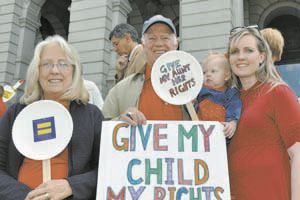
Steadman introduced the measure, dubbed Senate Bill 2, on the first day of the legislative session in January, and it easily passed out of the Senate Judiciary Committee in February. But Ferrandino said he delayed introducing it in the House in hopes of finding a Republican sponsor.

“We were waiting until after the Republican State Assembly, where you saw an actual vote of 46 percent of their delegates voting for civil unions,” Ferrandino said, referring to a vote on the GOP platform that took place in mid April. He added that being able to point to support from nearly half of the most hard-core Republicans in the state likely helped bolster the bill’s chances of passing once it made it to the House.
“We also were working with Republicans to try to get them to cosponsor it,” he said. “They asked us to wait, and that’s what we did. At the end of the day, we had definitely enough time to get it passed. It is the will of some in the majority party to not allow us to pass this bill.”
Steadman said on Tuesday that Rep. Kevin Priola, R-Henderson, was a potential House sponsor but had asked to postpone a decision until after the state assembly in fear of drawing a primary challenger before deciding against putting his name on the bill.
Regardless, Ferrandino said as the bill idled in the House, he rejected arguments that there was insufficient time to pass it.
“Since Senate Bill 2 came over here, we have seen 16 bills get introduced in the first chamber, 16 bills have been introduced to go through both chambers in the time it takes this bill to get through one chamber,” he said.
“The speaker sat on the bill,” Ferrandino charged, listing scheduling delays he said led to Tuesday night’s confrontation. “We could have had this easy on the floor on Monday,” he said adding that he had offered to convene over the weekend after the bill had passed its first hurdles in the House.
“If it means working the weekend to make sure every bill gets an up-or-down vote, that is what we should do, we shouldn’t undermine the democratic process,” he said.
But Waller was having none of it.
“I’ll tell you why this bill moved at a different pace,” he said, “because Democrats, they want us to be in this circumstance right now so they can increase their chance of taking back a majority in the state House next year. If this bill had come over two months ago, or even one month ago, we would not be in this circumstance right now. Civil unions would have had its hearing in the state House and we would be considering all these other bills the Senate sat on and sent us at the 11th hour.”
After the bill had been introduced in the House, with Ferrandino as sponsor, it moved relatively quickly through a gauntlet of committees.
Following a lengthy, impassioned hearing last Thursday night, the civil unions bill passed the House Judiciary Committee on a 6-5 vote with state Rep. B.J. Nikkel, R-Loveland, reversing the vote she cast last year when the bill died in the same committee on a party-line vote. After what Democrats complained was an unnecessary delay the next morning, Judiciary chairman, Rep. Bob Gardner, R-Colorado Springs, took care of the paperwork required to move it on to its next hearing, in the Finance Committee on Friday afternoon, where Rep. Don Beezley, R-Broomfield, joined that panel’s Democrats voting to send it on to the Appropriations Committee, its last stop before the House floor.
Minutes after casting the deciding vote, Nikkel described how she made up her mind.
“I ultimately decided that this is a legal issue,” she said. “It’s a very emotionally charged issue on both sides, and I think I got to the point of just recognizing that the bill, what it’s really doing, is providing some legal structure that I came to believe is really important and necessary to treat everybody the same here in Colorado. We’re all Coloradans, and I think we should probably all be treated the same.”
Nikkel, who decided to step aside rather than seek another term after being drawn into the same district as fellow Republican Rep. Brian DelGrosso, said her lame-duck status wasn’t a factor in her vote.
“I really had no pressure from the Republican Party and I had no pressure from my colleagues. I certainly got some pressure from – well, actually, a few folks here at the Capitol, but, actually, it was not a difficult decision for me,” she said, referencing an email blast sent out on the eve of the Judiciary hearing by Sen. Kevin Lundberg, R-Berthoud, urging Larimer County Republicans to lean on Nikkel because she wouldn’t commit to voting against the bill.
At a town hall meeting on civil unions held on Saturday at Lakewood’s city hall, Jefferson County legislators heard from a former Republican state lawmaker who said it was hard to overstate the kind of courage Nikkel displayed by breaking ranks with her vote.
“The reason you couldn’t get a Republican sponsor is because, sometimes, reelection trumps what’s doing right,” said Lakewood City Council member and former state Rep. Ramey Johnson, who acknowledged that she was probably one of only a few Republicans in the room. “When you buck your own party, sometimes you pay the ultimate price. Your own party will go after you.” Describing middle-of-the-night calls she received after a religious organization posted her home phone number on its website when she declined to sign a resolution on marriage some years ago, Johnson shook her head. “When you buck your own party, the harassment is over the top.”
The bill next went before the House Appropriations Committee, though it wasn’t heard until late Tuesday afternoon, and then only after Democrats ripped Republicans for filibustering the proceedings by spending hours discussing bills that couldn’t advance beyond the House that night. Still, the civil unions bill was assured passage out of the committee with the help of Rep. Cheri Gerou, R-Evergreen, who had publicly stated her support for the measure.
Though she provided the key vote, Gerou admonished the bill’s backers against framing the debate on partisan terms. She noted that Democrats didn’t push civil unions as recently as two years ago, when they controlled both chambers of the legislature and the governor’s office.
After the Appropriations vote, Ferrandino expressed optimism he had the votes in the House to remove two hostile amendments tacked onto the bill by Rep. Marsha Looper, R-Calhan, but acknowledged that Gerou was right to raise the point
“Hindsight’s 20-20,” he said. He pointed to other recent obstacles to civil unions, including a 2006 constitutional amendment defining marriage as being between one man and one woman, as well as the failure of a ballot measure the same year that would have established domestic partnerships. But most importantly, he noted, public opinion has shifted dramatically since Democrats controlled the legislative process.
“Within the last two years, the attitudes in our state and our country have changed significantly,” he said and pointed out that just in the last year support for gay marriage passed 50 percent among Americans polled by Gallup. “The attitudes are changing at rapid paces. I don’t know that we would have had the same level of support. We wouldn’t be here if Republicans weren’t standing with us for equality, and I applaud the Republicans, and we’ll have a lot more on the floor who will stand with us.”
The developments in Colorado occurred while news about same-sex unions also dominated national news. On the same day the Colorado legislation expired in the House, North Carolina voters approved a sweeping ballot measure banning all forms of legal recognition for gay couples, from domestic partnerships to full marriage. And the next morning, just prior to word that Hickenlooper would call a special session, President Barack Obama told ABC News he had decided, “that for me personally it is important for me to go ahead and affirm that I think same sex couples should be able to get married.”
In the wake of the bill’s demise in the House on Tuesday night, a prominent Republican attorney offered a withering assessment of his own party’s prospects.
“I’m surprised that, if you’re going to chose to kill it, you chose to kill it now in such spectacular fashion,” said Mario Nicolais, the spokesman for Coloradans for Freedom, a group of Republicans formed to support civil unions on conservative principles.
“I had really high hopes this morning,” he said, referring to a boisterous rally held on the steps of the Capitol. “I was even defending leadership for treating it in a fair process, and I called on them to make it that last mile and they just stumbled and fell. That’s really, truly unfortunate.”
He chastised his fellow Republicans for taking a short-sighted view that could come back to bite them at the polls this year.
“I’ve always looked at it in a long-term way,” Nicolais said. “Civil unions will pass. Equal rights will pass, because people will keep fighting for it. From my perspective, as a partisan Republican, the issue is, so will the Republican majority. I can’t imagine Colorado standing still for this.”
– Ernest@coloradostatesman.com






